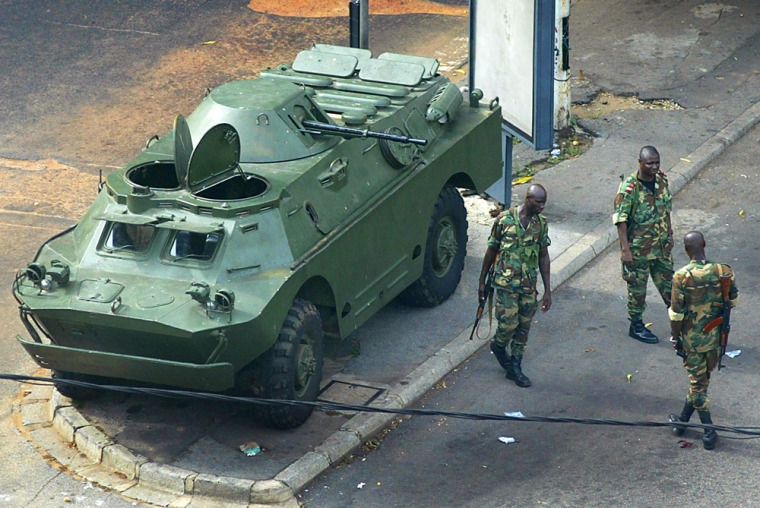Security forces cracked down on opposition strongholds in Ivory Coast’s largest city Friday, rounding up opponents as pro-government mobs with sticks and iron bars roamed mostly empty streets a day after bloody protests.
Amid sporadic and occasionally heavy volleys of gunfire, opposition leaders accused security forces of carrying out summary executions in different parts of the city. Police denied the charge.
In the rebel-controlled north, commander Sherif Ousmane told The Associated Press: “We will make every effort to liberate Ivory Coast of (President) Laurent Gbagbo.” He did not elaborate.
'Excessive force'
Human Rights Watch said 25 people were killed and 40 were wounded in Thursday’s anti-government demonstrations, which went ahead despite a government ban. In a statement from New York, the rights group accused security forces of using “excessive force” and said they should be held accountable.
Bacongo Cisse, spokesman for the opposition Rally of Republicans party, said the total death toll was 120 but government and security forces could not immediately be reached for comment, and it was impossible to verify the claim.
In the opposition strongholds of Abobo and Koumassi, witnesses said they saw at least six bodies in the street. Gray hearses with black curtains moved around the city, picking up the dead.
Gunfire could be heard for at least an hour before dusk in the old port district of Treichville, home to thousands of immigrants and the barracks for the Republican Guard. Security forces there detained dozens of young men, stripped to the waist, in two trucks.
In Abobo, police fired in the air, ordered residents indoors and whipped others who were detained on roadsides.
Paramilitary police and soldiers patrolled in small tanks, armored personnel carriers and pickup trucks. Youth militias loyal to Gbagbo roamed the streets in small groups, wielding wooden sticks and iron bars.
“If they are real men, they just have to come out today,” one group in Abobo chanted, referring to opposition demonstrators.
Peace deal withers
The violence, the worst in Abidjan since a failed 2002 coup split the nation in two, dealt a severe blow to a 2003 French-brokered peace deal in Ivory Coast, the world’s largest cocoa producer. On Thursday, rebels and two main opposition parties withdrew from the power-sharing government.
The United Nations is preparing to deploy 6,240 U.N. peacekeepers in early April to back about 4,000 French and 1,400 West African troops already in the country.
U.N. Secretary-General Kofi Annan expressed concern at the “tragic loss of lives” in Abidjan and urged all parties to fully implement the peace accord.
“At a time when the U.N. is preparing the deployment of a peacekeeping operation, the Ivorian parties must demonstrate the political will to reject all forms of violence and engage in genuine reconciliation,” Annan said in a statement.
Gbagbo told reporters at his residence he would hold talks with opposition parties on Monday to urge them to rejoin the government. But he blamed them for Thursday’s violence, saying they had a “diabolic wish to bring the insurrection into the heart of the population.”
Executions alleged
Cisse said security forces were rounding up opponents and killing some. Speaking earlier, he said police killed three youths in Abobo in front of a police station and “executed” 15 more in the southern Marcory district. He did not detail other alleged deaths.
Police spokesman Djanhoue Aubin denied the claims.
“It’s completely untrue,” he said.
Presidential spokesman Silvere Nebout said security forces were maintaining order after opposition leaders called on their supporters to continue protests Friday.
Gbagbo dismissed reports security forces shot at demonstrators.
Mohammed Coulibaly, a resident of Abobo, said armed men in military uniforms arrived in his neighborhood before midnight Thursday, shooting in the air. When they left, the corpse of one of his neighbors—an opposition militant—lay in the street.
Another resident, who gave his name only as Germain, said six young men were taken from their shared family house on Thursday night by the police.
“This morning, the body of one of them was found on the road,” he said. “Until now, we haven’t found the others.”
Flight from prayer
In another part of Abobo, scores of Muslims fled a mosque during prayers when soldiers arrived, shooting in the air.
“The faithful panicked and fled,” said Diaby Mamadou.
Youth militias, armed with machetes, knifes and guns, stood nearby, threatening those fleeing, he added.
Human Rights Watch urged security forces to exercise restraint.
“Equating civilian demonstrators with enemy combatants is totally unacceptable,” said Peter Takirambudde, executive director of Human Rights Watch’s Africa Division, said in a statement from New York.
“The state security forces had a duty to minimize the violence and act with restraint, but they have clearly failed to respect this obligation.”
Ivory Coast’s long-held reputation for stability was shattered after its first coup in 1999. A series of revolts followed, and a nine-month civil war that started in September 2002 saw rebels seize the northern half of the country.
Gbagbo’s government accuses rebels of plotting a new coup together with opposition parties—charges both groups deny.
